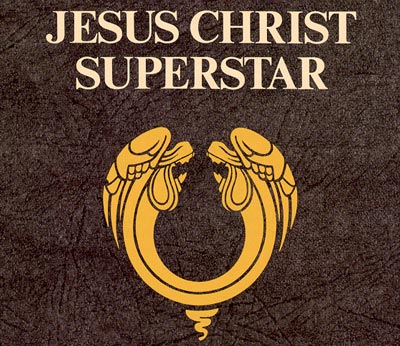Jesus Christ Superstar: Mining the meaning of the '70 rock opera
by Tim Young

DISC
ONE
1. Overture
(3:56)
An instrumental based on Trial Before Pilate, which appears
much later in the opera. Perhaps Trial Before Pilate was chosen
because it's really the centerpiece of the opera, in terms of the issues
it explores. More on that when the time comes.
2. Heaven
on Their Minds (4:21)
In spite of the opera's name, Judas really seems to be the central
character of the opera—or, at least, it's told from his point
of view. Indeed, he is the first character to appear, doing this entire
track solo. Stating "My mind is clearer now," Judas says he
realizes now where Jesus actions are leading, and he's displeased. Judas
thinks that Jesus is starting to get too full of himself, puffed up
by what others say about him:
You've started to believe the things they say of you
You really do believe this talk of God is true.
And now the good you've done will soon get swept away
You've begun to matter more than the things you say.
He concludes:
All your followers are blind
Too much heaven on their minds
It was beautiful but now it's sour
Yes it's all gone sour.
In fact, like all the other characters, Judas is totally clueless as
to what Jesus' true purpose is. He warns Jesus to keep from stirring
up trouble if he doesn't want to be killed, not realizing that Jesus
believes he must be killed.
While Judas' being made to look good in JCS is a matter for
debate, it is certainly true that his betrayal of Jesus makes him a
central character. His assertion that Jesus is losing his focus and
becoming drunk with power is his given reason for turning Jesus in.
But is he being honest with us? or even with himself?
3. What's
the Buzz/Strange Thing Mystifying (4:13)
Throughout JCS, Jesus comes off as being pretty cranky. Well,
how would you feel if your dad wanted you to die for the world's
sins?
Here, for example, Jesus scolds the disciples for asking impatiently,
repeatedly, "What's the buzz? Tell me what's happening." When
Mary Magdalene comforts Jesus, Judas criticizes Jesus for hanging out
with such women (JCS seems to subscribe to the idea, which recently
has been falling out of favor with biblical scholars, that Mary Magdalene
was a prostitute), because to do so seems inconsistent with Jesus' religous
message. Jesus takes it as criticism of Mary herself, and really flies
off the handle:
Who are you to criticize her?...If your slate is clean,
then you can throw stones
This exchange comes off as a missed connection between Judas and Jesus.
Judas was really criticizing Jesus, not Mary. One might have expected
Jesus to respond that his message was one of forgiveness, not exclusion,
of those who have done wrong.
4. Everything's
Alright (5:14)
Mary tries to calm Jesus with a myrrh ointment, but then Judas, seeming
eager to play holier-than-thou, pipes up again:
Woman your fine ointment, brand new and expensive
Could have been saved for the poor
Why has it be wasted? We could have raised maybe
Three hundred silver pieces or more
People who are hungry, people who are starving,
Matter more than your feet and hair.
Jesus angrily responds:
Surely you're not saying we have the resources
To save the poor from their lot?
There will be poor always, pathetically struggling
Look at the good things you've got!
Think! while you still have me
Move! while you still see me
You'll be lost and you'll be so sorry when I'm gone
How is this different from the Bible version of this exchange? John
Chapter 12 (New International Version) reads:
3 Then Mary took about a pint of pure nard, an expensive
perfume; she poured it on Jesus' feet and wiped his feet with her hair.
And the house was filled with the fragrance of the perfume.
4 But one of his disciples, Judas Iscariot, who was later
to betray him, objected,
5 "Why wasn't this perfume sold and the money given
to the poor? It was worth a year's wages."
6 He did not say this because he cared about the poor but
because he was a thief; as keeper of the money bag, he used to help
himself to what was put into it.
7 "Leave her alone," Jesus replied. "It was
intended that she should save this perfume for the day of my burial.
8 You will always have the poor among you, but you will
not always have me."
The most striking difference here is that John inserts commentary about
Judas' alleged motives, that he really wanted the money not to be spent
so he could steal it. Presumably, John's Jesus knows this and thus responds
as he does.
Webber & Rice's Jesus, however, shows no suspicion that Judas is
stealing from the treasury. His reaction in the opera comes off as much
more self-important, and to the slightest extent touches on the theme,
which crops up repeatedly later, of "How will I be remembered when
I'm gone?"
5. This
Jesus Must Die (3:33)
Caiaphas, Annas, and other priests discuss what to do about Jesus'
threat to their authority. Meanwhile, down in the street, Jesus is entering
Jerusalem, and the crowd greets him with palm branches.
While this is a fun piece, and serves to advance the story, it doesn't
really touch on any larger theme.
6. Hosanna
(2:08)
The action moves outside to the street. As the crowd cheers Jesus,
Caiaphas tells Jesus to keep the racket down, they're trying to plot
his demise:
Tell the rabble to be quiet we anticipate a riot
This common crowd is much too loud
Tell the mob who sing your song that they are fools
and they are wrong
They are a curse, they should disperse
Jesus' response is quite Biblical:
Why waste your breath moaning at the crowd?
Nothing can be done to stop the shouting
If every tongue was still the noise would still continue
The rocks and stones themselves would start to sing
7. Simon
Zealotes/Poor Jerusalem (4:47)
I haven't succeeded in finding an basis in the Bible for this section,
or a character called Simon
Zealotes, but essentially this amounts to an articulation of the
position that Jesus should come as a traditional king who should foment
a rebellion against the Roman occupiers:
There must be over fifty thousand
Screaming love and more for you
Every one of fifty thousand
Would do whatever you ask him to
Keep them yelling their devotion
But add a touch of hate at Rome
You will rise to a greater power
We will win ourselves a home
Jesus response is, essentially, "you just don't get it."
Indeed, it becomes increasingly clear throughout the opera that absolutely
no one "gets" Jesus or his belief that God is controlling
events. This is certainly consistent with the Bible. In JCS,
it fits with the theme that, while Judas says later on "You should
have had it planned," everything that's happening is,
in fact, the plan!
Jesus concludes:
While you live your troubles are many, poor Jersusalem
To conquer death you only have to die
8. Pilate's
Dream (1:26)
Why is this sung to the same tune as "Poor Jerusalem"? Apparently
we're meant to see some comparison or contrast between Jesus and Pilate.
Pilate dreams of the events to come: meeting Jesus, who refuses to
answer his questions; Jesus being killed by a group of "wild and
angry men"; and Pilate getting the blame. (Scholars believe Pilate
deserved the blame, but let's not muddy the waters with historical facts!)
Pilate, in keeping with a major theme of JCS, is concerned about
his image in future generations. The dream seems to be a signal to him
to beware how he handles the situation; he doesn't want to be blamed
for Jesus' death.
9. The
Temple (4:40)
The moneylenders and merchants are using the temple for commercial
purposes, calling out to customers to come try out their wares. Interestingly,
Webber puts this to a haunting, minor-key melody, giving it a rather
sinister feel.
Jesus chases them out of the temple, then shows his "Messiah fatigue":
My temple should be a house of prayer
But you have made it a den of thieves
Get out, get out
My time is almost through
Little left to do
After all I've tried for three years, seems like thirty
A crowd then approaches him, asking him to heal their maladies; Jesus,
sounding really fed up, cries "Heal yourselves!"
10. Everything's
Alright (:30)
11. I
Don't Know How to Love Him (4:07)
One of the most famous tunes from JCS. Mary Magdalene, the (alleged)
prostitute, wonders how, with all the experience she's had with men,
she can still be so nervous around Jesus.
You could argue that including this piece was just an excuse to have
a love ballad, that Mary's attraction to Jesus has no bearing on the
rest of the story. But after looking at the latter part of the opera,
where the meat really is, I realized that there is an important aspect
to "I Don't Know How to Love Him" that's consistent with JCS's
themes.
Mary sings:
He's a man, he's just a man
And I've had so many men before
In very many ways
He's just one more
This indicates that she, just like everyone else, believes Jesus to
be just a traveling preacher. It's not clear whether she's aware of
Jesus' talk of God's plan for him, but if she is, she doesn't take it
seriously. Most Christians would dispute her assuption that he's "just"
a man!
12. Damned
for All Time/ Blood Money (5:07)
Judas meets with Caiaphas and Annas to set up his betrayal of Jesus,
making every excuse he can think of to make his motives look pure:
I came because I had to I'm the one who saw
Jesus can't control it like he did before
And furthermore I know that Jesus thinks so, too
Jesus wouldn't mind that I was here with you.
Based on his rationale here, and what he says in "Heaven on their
Minds" and elsewhere in JCS, it appears that Judas doesn't
even believe in God, which sort of makes you wonder why he became a
disciple. His main concern -- as with Pilate and others -- is how he'll
be remembered by future generations:"Don't say I'm damned for all
time." Later, in "Judas' Death," Caiaphas tells him,
"You'll be remembered forever for this" -- a nice ironic line,
since Judas certainly was remembered, but in a negative rather than
a positive light!
What does JCS mean to say about Judas? It seems that we're supposed
to believe the reasons he gives for betraying Jesus, since what he says
to Annas and Caiaphas is consistant with what he's said about Jesus
up to this point: He thinks Jesus has strayed from his original path,
he's letting things go out of control. But is that a reason to turn
him in to the authorities? Yes, if it will spare his own neck. He most
likely figures that if no one turns Jesus in, the authorities could
eventually come and arrest Jesus and all the disciples. Still, it seems
as if JCS is telling us that Judas believed he was doing the
right thing, and that the authorities would go easy on Jesus once they'd
arrested him.
(By the way, the "Damned for All Time" music sounds an awful
lot like the theme of a certain campy TV show that went out of production
right about the time JCS came out. Holy plagiarism, Batman...)
Global Sounds home


![]() This page last updated
December 27, 2003
. E-mail Tim
This page last updated
December 27, 2003
. E-mail Tim